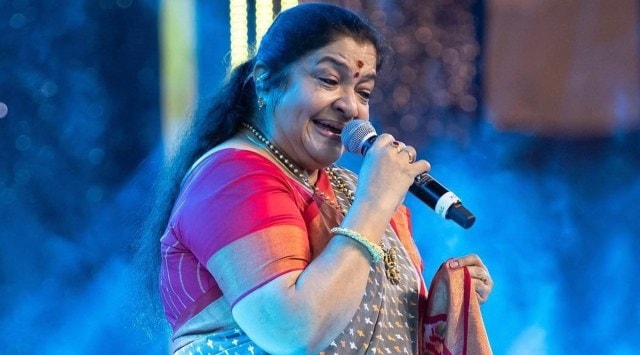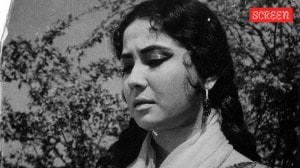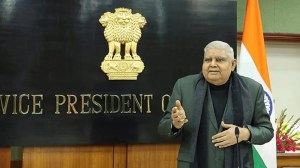Click here to follow Screen Digital on YouTube and stay updated with the latest from the world of cinema.
KS Chithra: An ode to a nightingale, the favourite choice of Malayalam musicians even after 4 decades
As one of the most celebrated playback singers in the annals of Indian cinema, KS Chithra, who turns 60 on July 27, embodies an exceptional vocal range.
 With an extensive repertoire of more than 25,000 recorded songs in various languages, KS Chithra stands as an illustrious figure in the music industry. (Image: K S Chithra/Facebook)
With an extensive repertoire of more than 25,000 recorded songs in various languages, KS Chithra stands as an illustrious figure in the music industry. (Image: K S Chithra/Facebook) Kadhayile hooriyo njan? Kadal nadukko ninte marathaka gruham?
Karuthivacho neeyenikkay ee aparichithapuram?
Ividamo sharanalayam? Nee tharum karunakaram?
Nammalethiya pavizhadweepa hridham? Thediya theeram dhooram?
This stanza from the song “Theerame”, composed by Sushin Shyam and penned by Anwar Ali, brings a profound sense of comfort and tranquility to its listeners, especially those familiar with Malayalam. From the movie Malik (2021, Dir. Mahesh Narayanan), it beautifully captures the love shared between the newly-wedded central characters, Sulaiman (Fahadh Faasil) and Roselyn (Nimisha Sajayan). The stanza revolves around Roselyn’s discovery of the idyllic “coral-isle haven” that her love has prepared for them after they eloped from their hometown. Upon setting foot on this land, she immediately senses a warmth and security that only love can provide. Through her exclamations, the lyrics express what this place and their relationship signify to them, and her optimistic belief that it will bring them solace.
Though Sushin Shyam, renowned for his unconventional tracks and mesmerising background scores, had the freedom to collaborate with contemporary singers or unearth a fresh, new voice, he made a delightful choice here. By entrusting the ethereal vocals of KS Chithra, lovingly referred to as the nightingale of Malayalam, he received a reward beyond measure. This decision elevated the song to new heights, setting a remarkable standard for modern melodies that resonates deeply with listeners.
Despite the gradual disappearance of her fellow peers, whether due to personal choices or a dearth of opportunities, Chithra remains a radiant star in the domain of Malayalam playback singing and she consistently delivers remarkable and unforgettable songs over time.
As one of the most celebrated playback singers in the annals of Indian cinema, Chithra, who turns 60 on July 27, embodies an exceptional vocal range. Despite having a solid foundation in Carnatic music, Chithra’s artistic spirit knows no bounds and has fearlessly embraced a myriad of musical genres. The very Chithra, who bagged a National Film Award for Best Female Playback Singer with the song “Padariyen Padippariyen” (Sindhu Bhairavi, 1985, Dir. K Balachander), composed by “Isaignani” Ilaiyaraaja in Saramati raga, accentuating the beauty of swaras, has also captivated the hearts of music aficionados through her entrancing rendition of one of Malayalam cinema’s most seductive songs, “Ezhimala Poonchola” (Spadikam, 1995, Dir. Bhadran) composed by SP Venkatesh and penned by P Bhaskaran.
With an extensive repertoire of more than 25,000 recorded songs in various languages, Chithra stands as an illustrious figure in the music industry. Her exceptional talent has been acknowledged with six prestigious National Film Awards (1986, 87, 89, 96, 97, and 2004) and over 30 State Film Awards from various regions. Even after four decades, Chithra remains a beloved and sought-after choice among musicians, a testament to her enduring charm and unmatched musical prowess.
One of the primary reasons for her continuing popularity is her skill to effortlessly grasp and render even complex songs with intricate alaps or hummings. Yet, it is her mesmerising gift to breathe life into the very soul of lyrics, unearthing emotions that dwell on both the surface and in the profound depths, that truly stand out. As she entwines her voice with the movie’s essence, mirroring the characters’ emotions and life’s poignant junctures, each track becomes an eternal signature of her artistry, leaving an indelible mark on all listeners.
The melodic masterpiece “Manjal Prasadavum” from the movie Nakhakshathangal (1986, Dir. Hariharan) is a testament to Chithra’s vocal prowess as it captures the essence of her commanding control over her voice. Set in the enchanting raga Mohanam, Chithra’s rendition of this musical gem composed by Bombay Ravi is nothing short of mesmerising. Each word, penned by the gifted ONV Kurup, she utters receives utmost care and expression, resulting in a truly riveting experience. As her voice weaves through the song, it harmoniously complements the emotions portrayed on the silver screen, immersing the audience in the realm of romance.
Although Chithra has frequently acknowledged legendary playback singer S Janaki as her inspiration and that she has strived to emulate some of Janaki’s emotive expressions while singing, the former stands out as the sole vocalist capable of truly upholding Janaki’s legacy in effectively conveying both surface-level and profound emotions in the songs. Chithra’s National Award win for her rendition of the Hindi song “Payalay Chunmun” (1997, composed by Anu Malik and penned by Javed Akhtar), despite it being a remake of the song “Inji Idupazhagi” (1992, composed by Ilaiyaraaja and penned by Vaali) sung by S Janaki, which earned her a National Award for the original track, reaffirms Chithra’s position as the rightful successor to Janaki.
The fact that composers Bijibal and Rex Vijayan chose Chithra to sing the tracks “Anuraga Madhuchashakam”, “Pottithakarnna Kinavu” and “Vasantha Panchami”, which were originally sung by S Janaki in the movie Bhargavi Nilayam (1964, composed by MS Baburaj and penned by P Bhaskaran), when they remade them for Aashiq Abu’s Neelavelicham (2023), further emphasises this point. And needless to say, Chithra’s remarkable singing not only recreated the enchantment of Janaki’s renditions from almost 60 years ago when Chithra was just a one-year-old but also met the high standards set by the “Queen of expressions” Janaki.
Chithra’s ability to weave the same enchantment over the years has endeared her to young film musicians as well. The manner in which she delves into the depths of lyrics, extracting their complete emotional essence, while seamlessly integrating the song into the narrative of the film, becomes a valuable advantage for composers. It simplifies the task of creating truly captivating songs that leave audiences utterly spellbound.
The evocative sentiment of yearning for something lost, which she artfully brought forth through her captivating rendition of “Aaro Viral Neetti” (Pranayavarnangal, 1998, composed by Vidyasagar and penned by Gireesh Puthenchery) finds its resonance once again in “Oru Theera Novu” (Mohan Kumar Fans, 2021, composed by Prince George and penned by Jis Joy) too.
If one is awestruck by the enchanting manner in which she transports listeners to the celestial realm of love through the song “Pranayasaagaram” (Poomaram, 2018, composed by Vishnu Sivasankar and penned by Balachandran Chullikkadu), it is essential to recall that Chithra achieved a similar feat with the song “Indupushpam” (Vaisali, 1989, composed by Bombay Ravi and penned by ONV Kurup) as well. And not to mention how she gently plants seeds of hope and longing within us through the mellifluous notes of “Ovvoru Pookalume” (Autograph, 2004, composed by Bharadwaj and penned by Pa Vijay).
With the wish that she continues to enthrall us for countless more years; Happy Birthday Chithra Chechi!


Photos
- 01
- 02
- 03
- 04
- 05
































